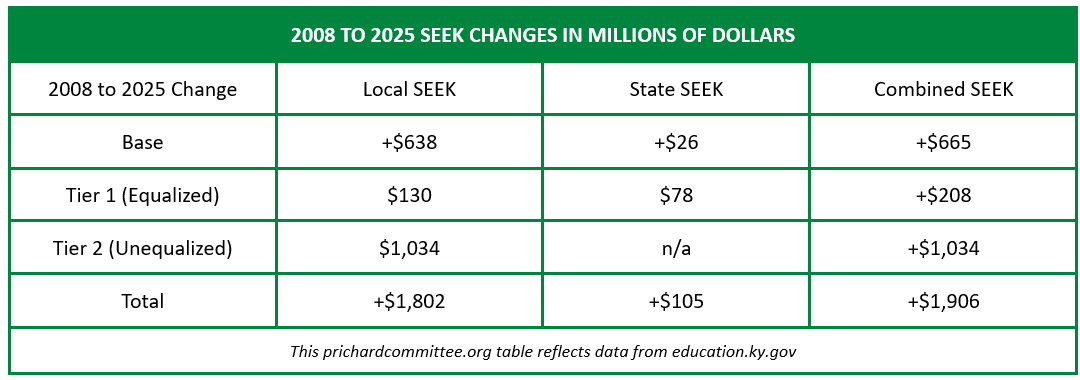September 22, 2022
FOR IMMEDIATE RELEASE
For More Information, Contact:
Benjamin Gies
502-381-1192
ben@prichardcommittee.org
Kentucky Leaders Warn Tough Times Ahead for Child Care Access Without Significant State Investment
FRANKFORT, KENTUCKY – The Prichard Committee for Academic Excellence and a team of statewide partners including Kentucky Youth Advocates, Metro United Way, United Way of Greater Cincinnati, United Way of Kentucky, Appalachian Early Childhood Network, Learning Grove, 4-C, EC LEARN, and others released their findings today from A Fragile Ecosystem IV: Will Kentucky Child Care Survive When The Dollars Run Out? The survey of Kentucky child care providers underscored how the sector will be impacted once federal American Rescue Plan COVID relief dollars run out.
The survey found that:
- Over 70% of Kentucky child care providers will be forced to raise tuition for working parents
- Close to 40% indicated that providers would cut staff wages
- Close to 30% of child care providers said they would layoff staff
- Over 20% of providers indicated they would permanently close their child care center
“Nearly three years into the pandemic, Kentucky’s child care sector remains on shaky ground and the sector is bracing for more challenging times ahead. The results of A Fragile Ecosystem IV show the need for greater financial support from Frankfort, and for continued substantial, engaged planning with providers,” said Benjamin Gies Director of Early Childhood Policy & Practice for The Prichard Committee.
“As Kentucky rapidly approaches a funding cliff caused by the end of federal American Rescue Plan funding, time is of the essence to ensure Kentucky’s child care and early education infrastructure is sustained and strengthened for working parents immediately and in the long term,” said Brigitte Blom, President & CEO of The Prichard Committee.
The event in Frankfort was joined by statewide early childhood advocates, members of the KY Strong Start Coalition, and legislative leaders.
“Child care is the workforce behind the workforce,” said Representative Samara Heavrin (R-18). “Without access to affordable and quality child care, more Kentuckians will be kept out of the workforce. The lack of accessible child care already accounts for a loss of over $570 million in lost earnings, business productivity and tax revenue each year in Kentucky. This is why I am an advocate for the private sector to be involved in the process. We need to encourage more of our businesses here in Kentucky to start looking at offering some type of childcare as a benefit to their employees, just as they would insurance or leave time. Our commonwealth cannot afford to see child care access worsen, because we cannot afford to lose more people in our workforce.”
“In these past two years, the vital nature of early childhood education, particularly reliable and accessible childcare, has become more apparent to the public,” Senator Danny Carroll, R-Benton, said. “Kentucky’s child care sector has faced immense challenges. Today’s press conference and dialogue aim to bring awareness to additional challenges on the horizon as federal ARPA dollars supporting centers lapse. I, co-chair Heavrin and all members of the Early Childhood Education Task Force are working with intent and purpose to identify ways to help providers and families. Across the workforce spectrum, we are seeing businesses, schools, law enforcement and so many more starving for employees. Kentucky’s workforce is the greatest obstacle to continued economic growth, and I consider a solution to childcare needs fundamentally important in addressing workforce needs.
Senator Carroll added, “I appreciate the Prichard Committee being an ally in our efforts to strengthen the state’s childcare sector and bring awareness to the issues facing Kentucky child care providers and those they serve.
Senator Carroll and Representative Heavrin also serve as co-chairs of the Kentucky Early Childhood Education Taskforce, a bipartisan group of state legislators working to develop long term solutions for Kentucky’s early education sector.
Dr. Terry Brooks, Executive Director of Kentucky Youth Advocates added, “Parents cannot go to work if they don’t have access to reliable and affordable child care in their community in which their children are safe, cared for, and learning. Quality child care is the key to a strong future workforce in Kentucky, especially as centers provide an important environment for children to develop problem-solving and other social skills. An investment in child care now is an investment in our future.”
State advocates urged leaders in Frankfort to keep early childhood funding top of mind as legislators plan for Kentucky’s next budget session in 2024. As Kentucky speeds toward a funding cliff caused by the end of federal American Rescue Plan funding, the fate of working parents, and their ability to fully contribute to the commonwealth’s economy, hangs in the balance.
“Kentucky’s child care crisis began long before 2020,” Metro United Way President & CEO Adria Johnson said. “Perhaps the steady pace of closures muted the collective impact. But, in 2020, the closing of doors rang throughout our communities, and today child care providers tell us it will become deafening without action. Metro United Way is deeply grateful to work alongside policymakers and administrative leaders dedicated to ensuring Kentucky families and employers have the accessible, affordable, quality child care sector our Commonwealth needs. We urge them–and all–to hear the voices in A Fragile Ecosystem. They are the sounds of solutions.”
Shannon Starkey-Taylor, Learning Grove CEO added, “We want to thank the Prichard Committee and our Kentucky partners for eliciting these survey results. They provide important insight into the immense struggle in the child care sector to maintain financial viability and quality care and instruction under the pressures caused by Covid and economic stress on wages.
To read the full report, click here.
###
The Prichard Committee for Academic Excellence is an independent, nonpartisan, citizen-led organization working to improve education in Kentucky – early childhood through postsecondary.












